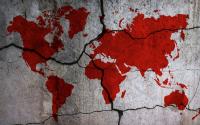Common Dreams / Published on Friday, July 1, 2005 by the Inter Press ServiceMarcela Valente
If a select international group of architects and engineers warned that a house already showing cracks and leaks was in danger of collapse, the residents would logically adopt immediate measures to prevent the imminent disaster.
But when it comes to the warnings made by scientists about the impact of climate change on the planet, their alarming forecasts are largely downplayed, and government commitments to reduce the risks are half-heartedly fulfilled, as if some magic solution will eventually make the problem go away.
The results of the preliminary meetings leading up to the United Nations Climate Change Conference, to be held Nov. 28 to Dec. 9 in Montreal, reveal that there is a serious lack of will to live up to these commitments.
In conjunction with the 11th session of the Conference of the Parties to the U.N. Climate Change Convention, the Canadian city will also be hosting the 1st Meeting of the Parties to the Kyoto Protocol, which entered into force in February, despite the U.S. withdrawal from the treaty.
Under the Kyoto Protocol, the industrialized countries must achieve a 5.2 percent reduction in greenhouse gas emissions in comparison with 1990 levels, by a deadline of 2012. The Montreal meeting will begin to address the issue of what the world's nations should do from 2012 onwards.
A report released this year by the Netherlands Environmental Assessment Agency stresses the need for all countries, and not just the industrialized nations, to assume some sort of commitment to curb emissions by the year 2020.
Otherwise, it will be impossible to meet the emissions reduction goals that the Intergovernmental Panel on Climate Change considers essential to neutralize the adverse effects of global warming.
Before the Montreal conference, the leaders of the Group of Eight (G8) most industrialized nations (Britain, Canada, France, Germany, Italy, Japan, Russia and the United States) will be meeting July 6-8 in Gleneagles, Scotland, where they will address the issues of climate change and development in Africa, among others.
The G8 countries are home to 13 percent of the world's population, but generate 45 percent of the so-called greenhouse gases that provoke global warming by trapping the sun's heat in the atmosphere.
One of the main sources of greenhouse gas emissions is the burning of fossil fuels such as coal, gas and oil. Other sources include cattle farming (due to the large amounts of methane, a greenhouse gas, emitted by livestock during the digestive process) and large-scale deforestation (when trees are cleared through the slash and burn technique).
But as the G8 Summit draws near, there are signs that it will be difficult to reach a consensus, even in the face of facts backed by solid scientific evidence, such as the increase in global temperatures brought about by human activity.
This gradual rise in temperature has resulted in more frequent and severe flooding, droughts and hurricanes, the melting of glaciers, a rise in sea level, an increased incidence of tropical diseases, and the loss of animal and plant species.
The national science academies of the G8 countries, Brazil, China and India signed a joint statement earlier this month stressing that there is ”strong evidence that significant global warming is occurring” and that it has ”already led to changes in the Earth's climate.” As a result, they believe it is ”vital” for the world's nations to take ”prompt action.”
But word has already leaked that the G8 representatives are reluctant to include this diagnosis in the resolution to be signed by the heads of government at the upcoming summit.
Roque Pedace from the Argentine branch of the international environmental watchdog Friends of the Earth told IPS that the results of the international seminar of government experts held May 16 and 17 in Bonn were ”extremely poor.”
”This reflected the lack of will to move forward on the part of the United States and also countries like Brazil, China and India, which have boycotted the process,” he observed.
For Pedace, it is ”highly unlikely” that greater commitments will be achieved in Montreal.
He also believes there is a serious danger that the process of committing to emissions reductions will be abandoned, and that efforts to curb global warming will focus on ”technological advances that might be developed in the distant future.”
What is most urgently needed to reduce emissions, he stressed, is ”political will.”
The Climate Action Network (CAN), a coalition of 287 environmental groups from around the world, stressed in a statement to the seminar of experts meeting in Bonn that the climate change situation is ”urgent” and that a ”clear mandate for the negotiations coming out of Montreal” is essential.
”We cannot delude ourselves that we can engage the U.S. at this point, nor can we wait for the U.S. to change its views before we start post-2012 discussions,” the statement underlined.
”Continuity between the first commitment period and the second commitment period is crucial to ensure that emissions markets and other domestic policies do not falter,” it added.
But for the moment, these cries of alarm are falling on deaf ears, as are the calls for the creation of alternative forums for discussion.
Raúl Estrada, Argentina's ambassador at large for environmental negotiations, was the driving force behind organizing a seminar of experts that included the United States to study post-2012 prospects, but he admits that the meeting did not live up to expectations, and is pessimistic about the potential for success at the upcoming conference in Canada.
Estrada, who is the director of environmental affairs at the Argentine Foreign Ministry and a key figure in international negotiations on climate change, summed up the situation for IPS by noting, ”We have only a short time, but a lot of ideas, before we get to Montreal.”
Estrada met earlier this month with a Canadian government delegation that traveled to Buenos Aires with the goal of building bridges between the last U.N. Climate Change Conference, held in the Argentine capital in December 2004, and the upcoming conference in Montreal.
The Canadian delegation included newly designated ambassador for Climate Change Jacques Bilodeau and Norine Smith, assistant deputy minister for Global Climate Affairs at Environment Canada. They were joined in Buenos Aires by Jean Boutet, environmental issues advisor at the Canadian Embassy in Argentina.
The delegation told Estrada that they are planning a consultative meeting with representatives of 40 countries and will also travel to Saudi Arabia to urge its government not to boycott the initiatives on the conference agenda.
But Estrada emphasized that if Canada, as host country of the conference, does not select a key theme to be given priority in Montreal, the meeting will lack any truly relevant content.
His own recommendation would be to actively promote discussion on the commitments to be undertaken in the post-2012 period. Estrada believes that the business community needs a legal framework to make investments in clean technologies with long-term prospects.
The Montreal conference will also address the funds created under the Kyoto Protocol to finance climate change adaptation programs in the developing world, including one that specifically targets the least developed countries.
At last year's conference in Buenos Aires, progress in this area was obstructed when representatives of the Organization of Petroleum Exporting Countries (OPEC), headed up by Saudi Arabia, demanded compensation for the impact on their economies that would purportedly result from decreased consumption of fossil fuels.
Over the coming months, as the next conference approaches, the calls for urgent action voiced by environmental activists and the scientific community are bound to become even louder, and they hope that the world's leaders will listen more attentively than they have until now.






